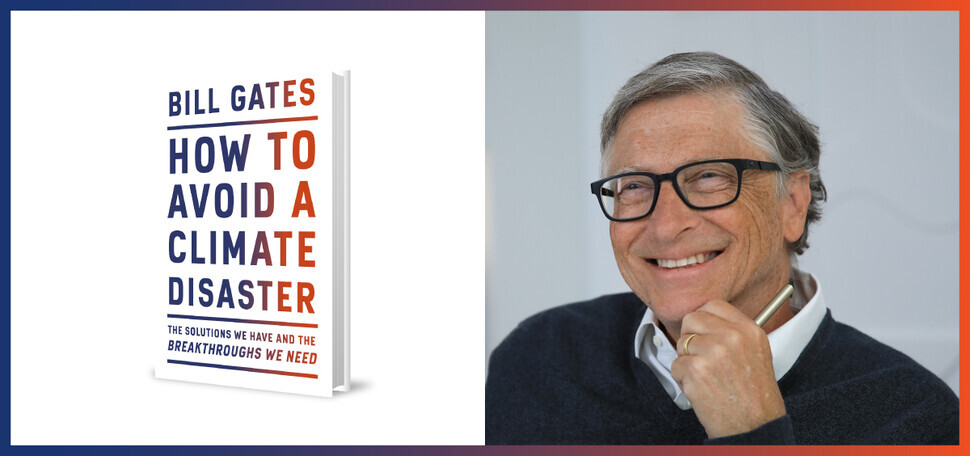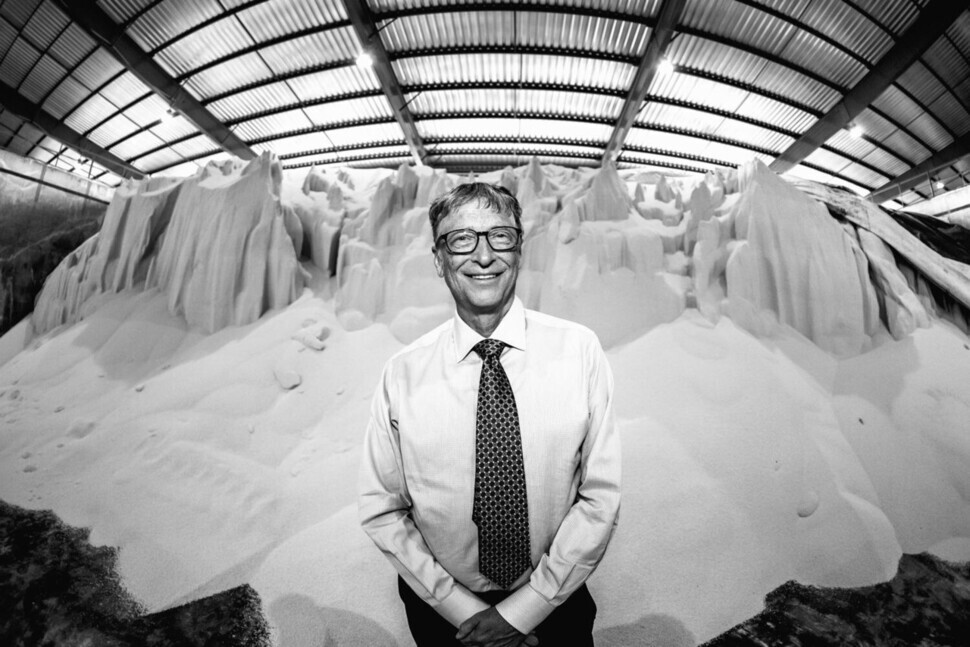hankyoreh
Links to other country sites 다른 나라 사이트 링크
Bill Gates wrongly portrayed as pro-nuclear energy in S. Korean media

On Feb. 16, “How to Avoid a Climate Disaster,” written by Microsoft founder Bill Gates, 66, was published simultaneously around the world.
As an avowed technophile, Gates argues that the next generation of nuclear reactors being developed by TerraPower, the nuclear energy company that he founded, should play a role in achieving net-zero greenhouse gas emissions. At the same time, he calls on governments to impose tough regulations on carbon emissions and quickly expand renewable energy to bring emissions — which currently amount to 51 billion tons a year — down to zero.
This is the first book that Bill Gates has published since establishing the Bill and Melinda Gates Foundation (named after himself and his wife) in 2000 with the goal of eradicating poverty and disease, and it attracted immense interest even before its release.
Gates’ initial interest was in supplying stable and affordable energy to the poor. But after learning about the connection between greenhouse gases and climate change, he fine-tuned that goal to providing stable and affordable energy that is also clean. That led to his investment in developing next-generation nuclear reactors.
Media outlets around the world have rushed to interview Gates and review his book. In South Korea, pro-nuclear energy newspapers like the Chosun Ilbo have twisted his book and comments to fit Korea’s debate between advocates and opponents of nuclear power.
During that process, Gates’ argument — which calls for technological innovation and transformation across all sectors of society, including energy production, manufacturing, agribusiness, transportation and climate control — has been truncated to the view that nuclear power is our only savior.
In its Korean translation, Gates’ book runs for 356 pages. The section that directly details nuclear power only covers 11 pages, and two of those are an explanation of nuclear fusion rather than nuclear fission.
More specifically, Gates isn’t talking about the current reactors on the market, but the next-generation nuclear reactors in development by TerraPower, the company whose board he chairs. Those reactors haven’t been commercialized yet; they only exist as computer simulations.
Gates describes his reactors as representing a new technology that is fundamentally safe, producing much less nuclear waste than current technology. He says the reactors are the most affordable route to eliminating carbon emissions and urges his readers to be open-minded about nuclear energy.

These remarks are aimed at the US, which hasn’t built any new nuclear plants for years. In fact, only two nuclear reactors have been built there since the Three Mile Island accident in 1979 and the Chernobyl disaster in 1986.
The New York Times had Gates’ book reviewed by Bill McKibben, an American environmentalist and journalist. Observing that the drop in prices of solar power is “50 to 100 years ahead of what the International Energy Agency was forecasting in 2010,” McKibben says that Gates has “not caught on yet to just how fast this engineering miracle is happening.”
In an interview with El País, an influential Spanish-language newspaper, Gates explained that he’s developing next-generation nuclear reactors because safety issues make today’s reactors unacceptable to the public. He also acknowledged that even if the new reactors are successful, it will still be challenging to convince the public to trust them.
In the longest review of the book, published by UK newspaper the Guardian, the word “nuclear” only appears in a single sentence.
“While the author supports the production of emissions-free power through nuclear reactors, that doesn’t equate to the argument that nuclear power is the only way to generate clean energy. Even then, he’s referring to next-generation nuclear reactors, not the reactors that we’re currently using. But in South Korea, the book is being misrepresented as promoting nuclear power,” said a source at Gimm-Young Publishers, which released the Korean translation of Gates’ book.
“The light water reactors that South Korea is adept at building are expensive facilities that require a large amount of capital,” said Kim Seon-gyo, an analyst at the Korea Institute of Science & Technology Evaluation and Planning who is an energy expert.
“Developing countries that actually need more electricity have trouble raising the capital required to build the plants. For that reason, Gates thinks it’s impractical to expand [the current technology], which is why he’s focusing on the futuristic technology of small nuclear reactors,” Kim said.
“Small nuclear reactors are often called ‘five-year technology,’ because people always say their success is five years in the future,” Kim said, adding that Gates’ next-generation reactors should be regarded as a possibility, rather than a practical alternative.
The overarching thrust of Gates’ book is about the need to reduce the planet’s annual emissions of carbon dioxide from their current level of 51 billion tons all the way down to zero. He’s particularly interested in technological solutions and even describes himself as a technophile.
Gates stresses that governments should play a bigger role in achieving these goals by regulating total emissions from power plants, automobiles and factories. He also argues that governments can solve problems that the market cannot and urges them to adopt policies to increase the price of using fossil fuels.
“Gates emphasizes next-generation nuclear power generation, but he places much more emphasis on investing in and quickly expanding renewable energy,” said Kim Byeong-kwon, director of the Justice Policy Institute, a think tank operated by South Korea’s social democratic Justice Party.
“Gates even supports setting steep prices on carbon, including a carbon tax,” added Kim, who is dubious about whether South Korea’s advocates of nuclear power would agree with Gates on such issues.
“The problem with the book is that it doesn’t talk about cutting consumption and transforming social institutions, which are essential for responding to the climate crisis,” Kim said.
By Park Ki-yong, staff reporter
Please direct comments or questions to [english@hani.co.kr]

Editorial・opinion
![[Editorial] Penalties for airing allegations against Korea’s first lady endanger free press [Editorial] Penalties for airing allegations against Korea’s first lady endanger free press](https://flexible.img.hani.co.kr/flexible/normal/500/300/imgdb/original/2024/0502/1817146398095106.jpg) [Editorial] Penalties for airing allegations against Korea’s first lady endanger free press
[Editorial] Penalties for airing allegations against Korea’s first lady endanger free press![[Editorial] Yoon must halt procurement of SM-3 interceptor missiles [Editorial] Yoon must halt procurement of SM-3 interceptor missiles](https://flexible.img.hani.co.kr/flexible/normal/500/300/imgdb/child/2024/0501/17145495551605_1717145495195344.jpg) [Editorial] Yoon must halt procurement of SM-3 interceptor missiles
[Editorial] Yoon must halt procurement of SM-3 interceptor missiles- [Guest essay] Maybe Korea’s rapid population decline is an opportunity, not a crisis
- [Column] Can Yoon steer diplomacy with Russia, China back on track?
- [Column] Season 2 of special prosecutor probe may be coming to Korea soon
- [Column] Park Geun-hye déjà vu in Yoon Suk-yeol
- [Editorial] New weight of N. Korea’s nuclear threats makes dialogue all the more urgent
- [Guest essay] The real reason Korea’s new right wants to dub Rhee a founding father
- [Column] ‘Choson’: Is it time we start referring to N. Korea in its own terms?
- [Editorial] Japan’s rewriting of history with Korea has gone too far
Most viewed articles
- 1Months and months of overdue wages are pushing migrant workers in Korea into debt
- 2[Editorial] Penalties for airing allegations against Korea’s first lady endanger free press
- 3Bills for Itaewon crush inquiry, special counsel probe into Marine’s death pass National Assembly
- 4Trump asks why US would defend Korea, hints at hiking Seoul’s defense cost burden
- 560% of young Koreans see no need to have kids after marriage
- 6S. Korea discusses participation in defense development with AUKUS alliance
- 7[Reporter’s notebook] In Min’s world, she’s the artist — and NewJeans is her art
- 8Korean firms cut costs, work overtime amid global economic uncertainties
- 91 in 3 S. Korean security experts support nuclear armament, CSIS finds
- 10[Guest essay] Maybe Korea’s rapid population decline is an opportunity, not a crisis